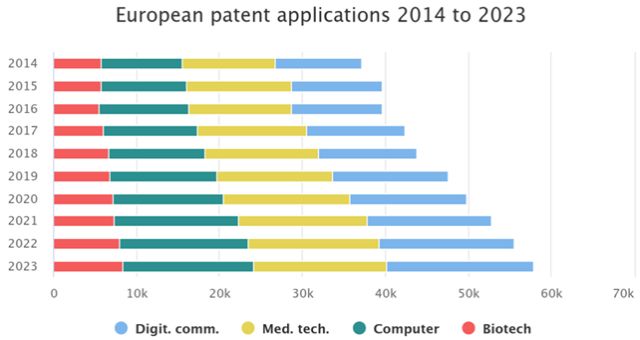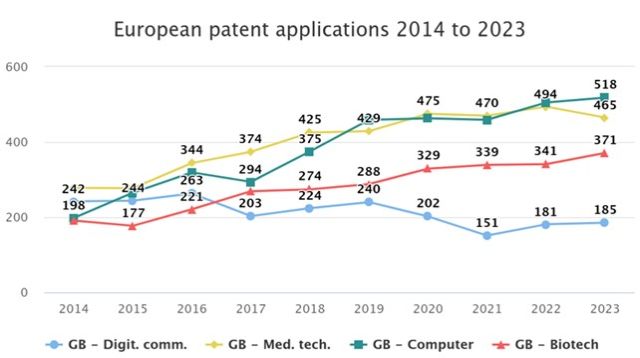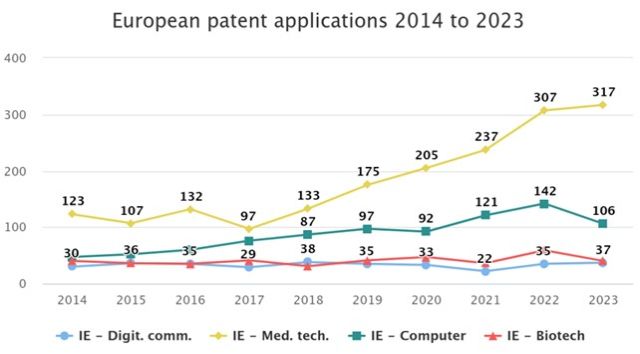The EPO recently published its 2023 Patent Index and there is, as seen in 2022, further increased patenting activity in key technologies relevant to the healthcare sector.
Spurred by the advent of transformative technologies including advances in AI capabilities and computing power, there is increased innovation in the fields of digital communications, medical technologies, and computer technology. For example, the rise of post-COVID solutions available in digital communications and therapeutics is evidence of the interest and potential for growth in this space.
It is not hard to see how computing technologies find applications in modern health solutions, such as remote patient monitoring and communication, AI-driven medical data analysis and diagnosis tools, robotic surgery, emerging specialised "techs" such as FemTech, SexTech, AgeTech and Mental Health Tech and digital transformations in the health space.
Patent filings in 2023 reflect this surge in digital health innovation, with the European Patent Office (EPO) reporting an increase in applications related to digital health technologies. Digital communication filings have seen a huge 8.6% increase to 17,749 on top of an already significant 11.2% worldwide increase in 2022, positioning it as the leading area for patent filings. Medical technology filings have increased by 1.3% rise in 2023 to 15,985, while computer technology follows closely with a 1.2% increase to 15,746 filings in 2023. Biotechnology has also seen a 5.9% increase in filings to 8,367 in 2023.

These figures support my observations over the last year in terms of the range of technologies I have worked on in digital health, which are increasingly in areas of crossover of traditional disciplines (such as AI in biotechnology). I work increasingly with my colleagues in the life sciences, chemistry, and engineering groups, to fully dive into the technical details of a client's innovation and work out a IP strategy suitable for their unique position.
As digital health technologies mature, the trajectory of these trends in the UK and Ireland is interesting. The number of both UK and Irish applicants filing applications at the EPO show a consistent increase in the fields of biotechnology and computer technology, with Ireland showing a marked steady increase in applications in medical technologies, perhaps reflective of the focus on innovation and support of the growing Irish MedTech scene.


Artificial Intelligence (AI) falls within the computer technologies category above, and is such a key technology right now that the EPO has specifically reported on this and how patent trends relate to the explosion of innovation in this area. The EPO reports that there is, inevitably, a huge focus on developing and utilising AI technologies, with over 2000 European patents relating to artificial neural networks alone, with applications in digital health including image analysis (for example to identify suspected cancer), autonomous robots (with applications in robotic surgery) and speech recognition (for example as used in assistive and therapeutic technologies).
Overall, the future holds exciting prospects for innovations in digital health and the data shows that inventing activity in this field continues to flourish.
For inquiries regarding patenting within the digital health space and in crossover innovations in MedTech and digital health, our multidisciplinary teams at HGF are ready to assist. With expertise spanning many facets of MedTech and digital health technologies, our diverse team of attorneys across Europe, including specialists in the UK and Ireland, is ready to speak to you.
The content of this article is intended to provide a general guide to the subject matter. Specialist advice should be sought about your specific circumstances.

